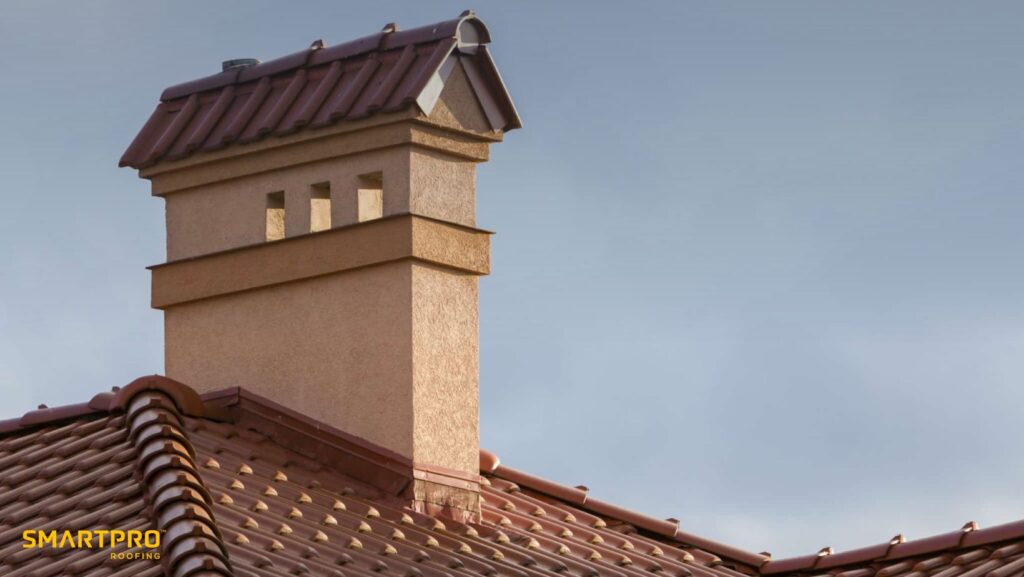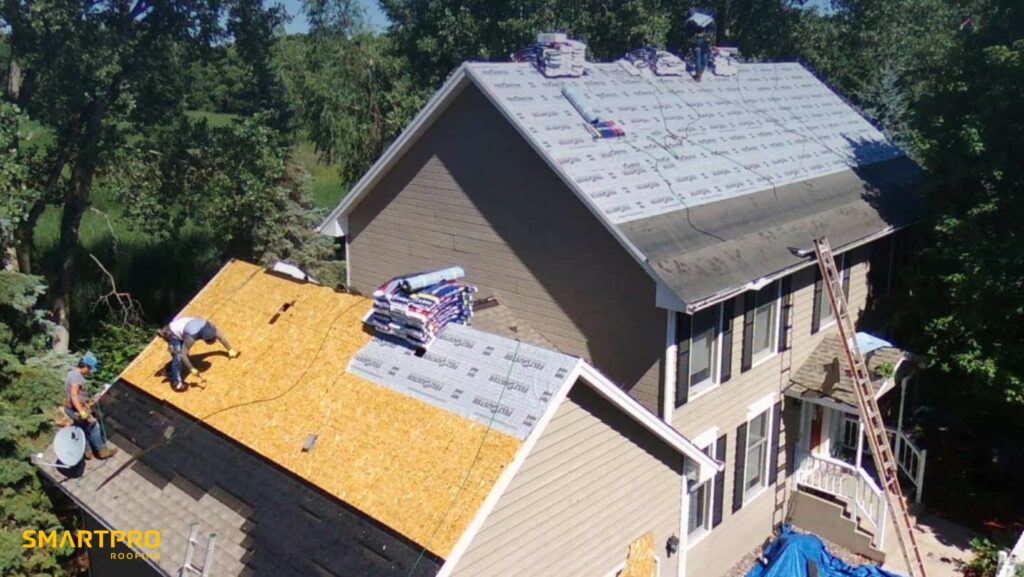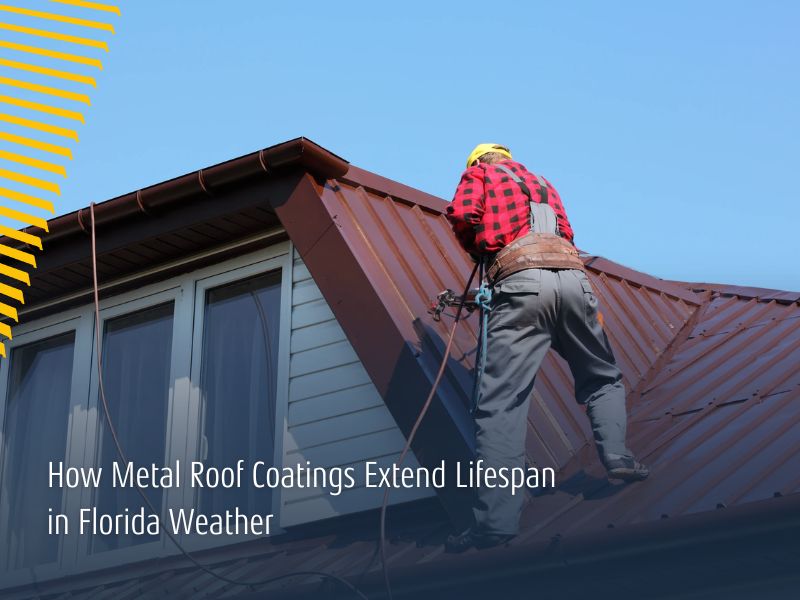To negotiate a roof replacement with insurance, start by documenting roof damage, filing an insurance claim, reviewing your insurance policy, and comparing the insurance company’s estimate with a roofing contractor’s assessment. If needed, negotiate with your insurance company for a full roof replacement to ensure they cover the cost fairly.
Dealing with a damaged roof after a storm can feel overwhelming, especially when insurance companies step in with complicated paperwork and fine print. The good news? With the right knowledge and strategy, you can negotiate roof replacement with insurance successfully, avoid underpayments, and restore your roof without unnecessary stress. This article breaks down the process step by step, from filing an insurance claim to understanding replacement cost value, so you know exactly how to protect your home in 2025.

What Does Insurance Typically Cover for Roof Replacement?
Insurance policies vary, but homeowners insurance typically covers roof damage caused by sudden perils like hail, wind, and storm damage to your roof. Insurance companies often deny coverage for normal wear and tear or an old, deteriorated current roof. To learn how to negotiate roof replacement, you need to first understand what insurance typically covers.
- Covered perils: hailstorms, hurricanes, fallen trees, or when a storm damages your roof.
- Exclusions: gradual roof repairs, lack of maintenance, or roofs past their lifespan.
- Policy types: some homeowners insurance policies provide full replacement cost value, while others only pay the depreciated value of your roof.
This is where insurance negotiation comes in. Every insurance company will send an insurance adjuster to inspect damages. Knowing what’s covered in your insurance policies before filing an insurance claim makes negotiation smoother and ensures the insurance company will pay fairly.
How to File a Roof Insurance Claim Correctly
Many homeowners fail to get full replacement because they make mistakes while filing an insurance claim. To avoid losing thousands in roof replacement costs, follow the correct claim process:
- Document roof damage immediately. Take detailed photos and videos of all damages your roof has sustained. This is the foundation of your roof damage claim.
- Contact your insurance company. Report the issue quickly to avoid disputes later. Be clear that you want to file a roof insurance claim.
- Schedule a roof inspection. A licensed roofing contractor can verify the damage to your roof before the insurance adjuster arrives.
Once the insurance adjuster will come, be present. The insurance adjuster to ensure nothing gets overlooked is critical. They provide the insurance company’s estimate, which may undervalue the roof replacement costs. This is when you need to be able to negotiate effectively.
What Happens When the Insurance Adjuster Undervalues Your Claim?
Insurance adjusters often work in favor of insurance companies. That’s why the initial offer from your insurance company may be far lower than the actual cost of a full replacement.
- If the insurance company’s estimate doesn’t cover the cost of a full roof replacement, don’t accept immediately.
- Hire a licensed roofing contractor who understands replacement cost value and can write an accurate estimate for roof replacement costs.
- Use this contractor’s report to challenge the insurance company’s estimate.
Remember: the insurance company may only offer to cover roof repairs instead of full replacement. But if the damage to your roof affects the entire roof system, you may qualify for full roof replacement. Negotiating with your insurance company at this stage is critical.
Should You Repair or Replacement: Which Is Better?

Many homeowners wonder whether they should accept minor roof repairs or push for a full replacement. The choice depends on roof damage coverage, the current roof age, and how insurance policies cover claims.
- Repair: If damages to your roof are isolated, insurance companies might suggest only covering roof repairs. This lowers insurance premiums but may not solve long-term issues.
- Replacement: If storm damage to your roof compromises the entire roof system, homeowners insurance company rules often require a full replacement. The cost of a full replacement may be high upfront, but it restores your roof’s full value.
A reputable roofing contractor can help you decide whether repair or replacement makes sense. They can also help you negotiate roof replacement with insurance companies for the best outcome.
How Do You Negotiate Roof Replacement With Insurance?
Learning how to negotiate roof replacement is the key to maximizing your claim. Here’s how to approach the insurance negotiation process:
- Thoroughly review your insurance policy. Before filing an insurance claim, understand your insurance policy to know what insurance typically covers.
- Bring in expert support. A contractor, preferably a licensed roofing contractor can spot missed damage to your roof and advocate during inspections.
- Challenge the depreciated value of your roof. Many insurance companies reduce payouts by offering only depreciated value. Push for replacement cost value instead.
- Be persistent. Negotiating with your insurance company isn’t about accepting the first offer. Insurance companies would prefer you don’t push back, but you can.
This step ensures you can negotiate roof replacement with your homeowners insurance successfully, so the insurance company should pay fairly to restore your roof.
What Role Does a Roofing Contractor Play in the Claim Process?

Hiring a contractor is not just about replacing shingles. A roofing contractor plays a vital role in the insurance claim process:
- Pre-claim inspections. Contractors provide accurate roof inspection reports before you file a claim.
- Adjuster negotiations. Contractors meet with the insurance adjuster to ensure damages are documented properly.
- Paperwork assistance. Contractors understand how insurance companies operate, which helps when dealing with an insurance company.
If you hire a licensed roofing contractor with experience in insurance negotiation, you strengthen your case for a fair roof replacement claim. A reputable roofing contractor ensures the insurance company will pay for what’s necessary to replace your roof, not just patch repairs.
What Is the Average Deductible for Roof Replacement in Florida?
Understanding deductibles is essential when negotiating with your homeowners insurance company. The deductible is the portion of roof replacement costs you must cover before insurance companies step in.
- Common range: $500 to $2,000 in most homeowners’ insurance policies.
- Special cases: Some insurance policies cover hail or hurricane damage separately with higher deductibles.
- Impact: Choosing higher deductibles lowers insurance premiums but increases out-of-pocket costs.
When negotiating, clarify how much of the cost value is your responsibility versus what the insurance company will pay. Always compare roof replacement with your homeowners insurance deductible against the replacement cost value before agreeing.
What Is the 25% Rule in Florida?
In Florida, state law requires a roof replacement if more than 25% of your current roof is damaged in a storm. That means:
- If roof damage coverage shows that storm damage to your roof exceeds 25%, your homeowners insurance company must approve a full replacement.
- Insurance won’t allow patchwork repairs in these cases, it requires a full replacement.
- This is why a roof inspection from a licensed roofing contractor is so important.
Knowing the 25% rule helps homeowners in Florida negotiate roof replacement with insurance companies effectively, ensuring the insurance company should pay for an entire roof instead of partial roof repairs.
How to Handle Delays and Denials From Insurance Companies
Dealing with insurance companies can be frustrating. Insurance company will send adjusters late, deny coverage, or claim insurance won’t cover certain damages. Here’s how to respond:
- If insurance won’t cover: Request written reasons and refer to homeowners’ insurance state regulations.
- If delayed: Escalate to the commissioner of insurance if delays exceed state timelines.
- If underpaid: Show documentation from a reputable roofing contractor to justify replacement cost value.
Every insurance claim is negotiable, and homeowners who learn how to negotiate are better positioned to secure successful insurance outcomes.
Why 2025 Is Different: Replacement With Insurance in 2025
Insurance policies evolve. In 2025, many homeowners insurance policies have stricter rules on roof replacement claim payouts. Insurance companies often:
- Push for depreciated value instead of replacement cost value.
- Require more thorough roof inspection evidence.
- Limit insurance coverage for older roofs.
This makes it more important than ever to learn how to negotiate roof replacement with your insurance company effectively. Replacement with insurance in 2025 may require stronger documentation, persistence, and professional support from SmartPRO or another licensed roofing contractor.
Helpful Tips for Negotiating Roof Replacement With Insurance
- Get a pre-claim roof inspection from a contractor before filing.
- Always compare your contractor’s estimate with the initial offer from your insurance.
- Keep records of all communication with the insurance company.
- Be patient. Insurance negotiation can take weeks.
- If the insurance company won’t cover your full replacement, escalate with documentation and expert input.
Protect Your Florida Home With SmartPRO
Insurance claims after storm damage can feel overwhelming, between paperwork, inspections, and the urgency of getting your roof repaired, it’s easy to feel stuck. The good news: you don’t have to go through it alone.
SmartPRO Roofing makes the process clear and straightforward for Florida homeowners:
- Thorough Inspections – Our team evaluates your roof condition in detail to help you understand the scope of damage.
- SmartQuote Tool – With SmartQuote Tool, you see exact pricing upfront. No guesswork, no hidden fees.
- Transparent Guidance – We walk you through your options, so you know what to expect before work begins.
- Florida Expertise – From permitting to final inspection, we follow local codes and requirements to ensure compliance.
When it comes to protecting your home, you deserve a roofing contractor who delivers both precision installation and clarity throughout the process.
If your Florida roof has storm damage, don’t leave your claim to chance. Schedule your SmartPRO Roofing inspection today and let our team help you secure the coverage and roof replacement for your home.
FAQs
- How do I file a roof insurance claim?
Document roof damage, contact your insurance company, schedule a roof inspection, and file a roof insurance claim with photos and contractor estimates. - What is the cost of a full roof replacement?
The cost of a full replacement varies but often exceeds $10,000. Insurance company would typically cover the cost of a full roof minus your deductible. - Can insurance deny roof replacement?
Yes, insurance won’t cover normal wear and tear or poor maintenance. Insurance company may also deny if the current roof exceeds age limits. - How can I negotiate a roof replacement claim?
Be able to negotiate with documents from a licensed roofing contractor, challenge the insurance company’s estimate, and thoroughly review your insurance policy. - Does homeowners insurance typically cover roof repairs?
Homeowners insurance typically covers sudden damages your roof sustains from storms but not gradual deterioration. Roof repairs are only covered if storm damages your roof.











